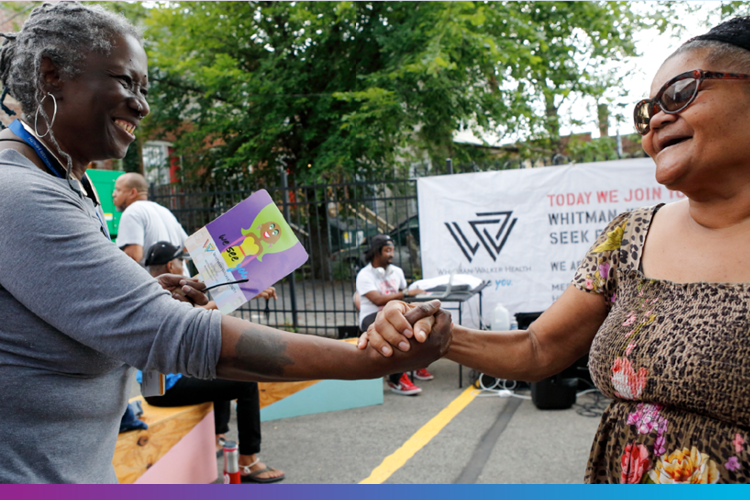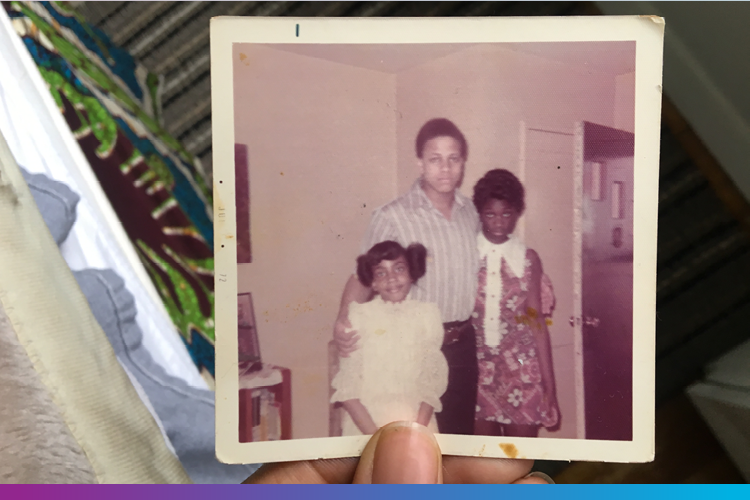As part of Whitman-Walker 40th anniversary, officially January 13, 2018, we’re sharing 40 stories to help tell the narrative of the Whitman-Walker community. Please meet D Magrini! Today, D is the Community Commitment and Training Coordinator at Whitman-Walker Health. D tells her story of first learning of HIV/AIDS as GRID from a gay man in Michigan who had come home to die. A native of Washington, DC, D describes her childhood in the city, her service with the military and her time working at Lambda Rising – an LGBT bookstore in DC from 1974-2010.
Click the orange play buttons below to hear parts one and two of D’s 2017 oral history – a recorded interview with an individual having personal knowledge of past events.
Four Quotes from D’s Oral History
On Her Childhood in Washington, DC:
“I was in Riggs Park, but my boyfriend and my friends all lived closer to Georgia Avenue, and it was nothing. We would walk that couple of miles, or maybe it’s three – I don’t even know now – we walked that like we were just walking around the corner. We would walk from Georgia and Kennedy all the way to the monuments, or catch the bus. But often we just walked. We walked where we were going. The monuments really were – it wasn’t the monuments; it was the museums that were the lifesaver. We went to a lot of movies. There’s no doubt that I spent way more time at the movies than I should have; basically during the time that I was supposed to be in school I just went to the movies. But other times we went to museums. We saw everything, and not just the art but the people viewing the art. In some ways it was like, everybody comes here, so there was an aspect of really out of your neighborhood, or really someplace else. So, that’s a lot of what we did, and we stayed in the park a lot. Rock Creek Park has places that still you can get in there and barely hear cars moving; barely hear it. But we would go in the park and just hang out. It was wherever we could just be ourselves, out of parental control. Wherever we could just be ourselves; that’s what we tried to do.”
On Being in the Last Class of WAC – Women’s Army Corps:
“It’s a weird thing to be proud of, but I am proud of this. I was in the group of the last women that were trained to be in the women’s army corps, which was separate – segregated just as the military had been around race. Women did this and dressed this way, and men did this. There was no bleed-over. Well, that’s not true. Nurses saw combat duty and cooks saw combat duty, but they didn’t talk about that so much. When I went in, I was officially a WAC, but I was in the first group of women that was trained in the regular army corps. So, just as the guys that were across wherever were trained, that’s what they were doing to us.
So, they didn’t know – they was goin’ go. But we had nothing to base it on. We were just like, ‘Hey, I don’t know what this is.’ So yeah, I am proud of having been a WAC, and I am certainly proud of having endured the service. Even after all these years, I don’t believe – it is certainly a situation that is survivable by women. I did. Women do every day. But, it is not ground that women are meant to thrive on. Whatever food you get, whatever sustenance you get; you have to figure that out yourself.
Your brothers, if you play it right, will take care of you. They will look after you. I had moments that will stay with me forever, small things that these men did as a group to look out for me. But they were also dangerous fucks. The same brothers that would tuck me in through the ranks when I got too tired to run and they know I didn’t want to quit, but I’m on the edge and your body will take over; they would scoot me up and move their moving bodies in a way that would put me in the center so I couldn’t get out, and they would keep me running. That is, like to me, just the mechanics of what that
takes in movement to do that is beautiful. But that they were thinking of it and that they could all agree silently to do that thing; it blows me away.”

D at the 2017 East of the River Fall Festival at Whitman-Walker’s Max Robinson Center.
On the Likeness between Black Homes & Korean Homes:
“I made friends, Korean friends; mostly women that were dancers. That was real cool ‘cause they would look out for me in the clubs and I got to sit with them, which pissed all the men off, absolutely, because they would bring me drinks and sit with me and hug me up and they would invite me to their homes like for lunch. So the next day I would go, and they spoke a little English and I spoke a little Korean. But they would take me to their homes with their parents or family who spoke no English. But they would feed me. It was like being home, only really on the other side of the world.
My experience of coming to black homes is people want to make the nicey-nice. They want to feed you. They want to host you. These people were hosting me, and these women trusted me enough to be able to come into their compound and not judge them in some negative way. That part was really good.”

D, right, stands with Bruce and her little sister.
On Her Friend Bruce and Learning it’s OK to Be Different:
“I think some people are – are God’s gifts to us in life and some of them show up really subtly and are there for a very short time. Some of them are huge and are almost, like, light posts or lamp posts or direction guides when you can look back, and Bruce was huge and about direction – about forming my direction. Looking back, the time really was short. I think we met when I was – that’s so weird. 13 or 14?
Yeah, right. So – but it was like junior high school kind of days, so 13 or 14, somewhere in there. Wow. Like, a child. I’ll show you a picture later. It’s very funny. But the main thing he taught me – the main thing he taught me is that it was okay to be weird; that you didn’t have to be like everyone else.
I kind of already knew that I was different in some way. I mean, everybody’s different in some way, but I felt there was a substantial – at first it didn’t feel like a disconnect, just that there was something else going on, but in connection with him I think I got to label some of what that other stuff was: our love for music, our curiosity around music and art, our curiosity in general and his ability to just be brave and break out of the confines of our little tiny world. The world of, you know, a few miles. He didn’t care. I mean, he was cool in the neighborhood, like when he was with his boys he was seamless in a way that I never was. You know, I was always, like, weird off over here, but when he was with his boys in the neighborhood he was Bruce and he was to be feared. That – you know, he was elevated like that. But when he wasn’t – it wasn’t like he was a different person, but he could be in any environment and just be about it, be knowledgeable about it, comfortable in it. So, I don’t know if I ever made that, but he certainly showed me these different options, different ways of doing that. It’s invaluable, that. So, if I can pick a person that – highest impact, it would be him.


